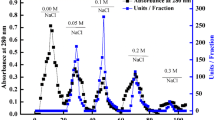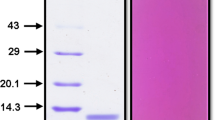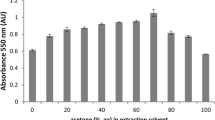Abstract
RECENTLY we reported1 the separation of pinguinain, the enzyme present in the fruit of the tropical plant Bromelia pinguin L. Using the technique of gel-nitration, we isolated the enzyme from the fruit juice and from crude acetone precipitates which also contained carbohydrates and low molecular weight peptides. Further work on this enzyme led to its crystallization, the procedure for which is the object of this communication.
This is a preview of subscription content, access via your institution
Access options
Subscribe to this journal
Receive 51 print issues and online access
$199.00 per year
only $3.90 per issue
Buy this article
- Purchase on Springer Link
- Instant access to full article PDF
Prices may be subject to local taxes which are calculated during checkout
Similar content being viewed by others
References
Toro-Goyco, E., and Matos, M., Nature, 203, 82 (1964).
Toro-Goyco, E., Matos, M., and Cancio, M., Fed. Proc., 22, 528 (1963).
Mills, G. L., in Chromatographic and Electrophoretic Techniques, edit. by Smith, I., 1, 143 (Interscience Publishers, Inc., New York, 1960).
Author information
Authors and Affiliations
Rights and permissions
About this article
Cite this article
TORO-GOYCO, E., MATOS, M. Pinguinain : a Simple Method for its Crystallization. Nature 210, 527–529 (1966). https://doi.org/10.1038/210527b0
Issue Date:
DOI: https://doi.org/10.1038/210527b0
Comments
By submitting a comment you agree to abide by our Terms and Community Guidelines. If you find something abusive or that does not comply with our terms or guidelines please flag it as inappropriate.



